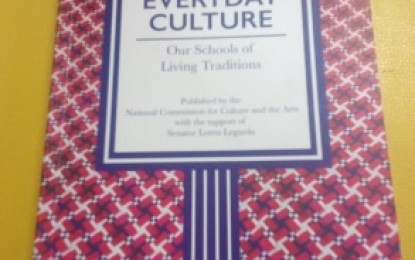
BOOK ON DAILY CULTURE. The National Commission for Culture and the Arts launches the book on 'Everyday Culture' that contains various Schools for Living Traditions in Antique on Wednesday (March 20, 2019). (Photo by Annabel Petinglay)
SAN JOSE DE BUENAVISTA, Antique -- The National Commission for Culture and the Arts (NCCA) launched its newly published book featuring different Schools for Living Traditions (SLT) of various cultural communities in the country.
Dubbed “Everyday Culture”, the book aims to safeguard and transfer the knowledge of cultural communities to future generations, said Berman Joseph R. Corpuz, chief of the NCCA Policy/Plan Formulation and Programming Division, during the book launching at the Robinson’s Mall Antique on Wednesday.
“We take pride in launching the book ‘Everyday Culture’,” he said.
He said the book will be a ready reference for students and researchers to delve into traditional arts, crafts and skills of the cultural communities from the northern, central and southern parts of the country.
The book features the Ibaloi of Atok and Kankanai of Mankayan, Jama Mapun of Palawan, Panay Bukidnon of Calinog, T’boli of South Cotabato, Subanen of Pagadian, Maguindanao and Kulibogan of Kumalarang, and Antique’s Living Traditions.
The buri and nito weaving of the Ati community in Antique, Patik-Kawayan or percussion instrument made of bamboo bars similar to marimba, and the traditional hand embroidery had been featured in the book.
Senator Loren Legarda, in her message during the launching, said this is the first of a series of books on Schools of Living Traditions intended to generate deeper awareness, appreciation and recognition of the traditional designs created and produced by the indigenous communities.
“This project is part of my commitment to preserve heritage. It is my hope that this book will not only promote knowledge on our traditions, but also encourage more Filipinos to protect our heritage,” Legarda said.
The Schools of Living Traditions is a flagship program of the NCCA initiated in 1995 to safeguard specific traditional cultural practices. (PNA)
